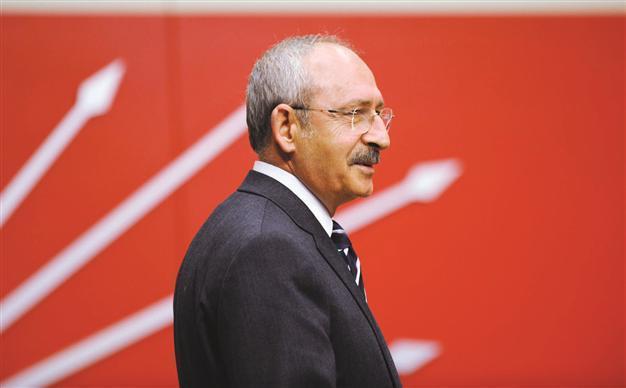Turkey's main opposition leader set to visit Baghdad
ANKARA - Hürriyet Daily News

Main opposition CHP leader Kılıçdaroğlu to visit Iraq. DAILY NEWS photo
Kemal Kılıçdaroğlu, the leader of the main opposition Republican People’s Party (CHP), will meet with Iraqi Prime Minister Nouri al-Maliki Aug. 21 in Baghdad, his party has announced.
Kılıçdaroğlu will land at Baghdad Airport which will be the venue for an official welcome ceremony Aug. 20. While in the Iraqi capital city, he will hold talks with prominent political actors, as well as have scheduled gatherings with Sunni and Shiite opinion leaders, the CHP said in a brief statement released Aug. 12.
The neighboring country’s disputed province of Kirkuk and the Shiite holy city of Najaf are also on the itinerary of Kılıçdaroğlu’s Iraq visit, which will end Aug. 24.
Kılıçdaroğlu told CNNTürk late Aug. 12 that he would visit Kirkuk during his trip to Iraq while adding that he would not visit the capital of northern Iraq, Arbil, because it was not on the itinerary. “But I will visit Arbil on another visit.”
Kılıçdaroğlu said he would ensure there was a balance in meeting both Sunni and Shiite groups in Iraq, adding that the trip would contribute to the relations between Turkey and the southeastern neighbor.
Today, deputy chair of the CHP, Faruk Loğoğlu will host a press conference in Parliament in order to announce the details of Kılıçdaroğlu’s trip.
Kılıçdaroğlu also plans to visit to Iran and Tunisia, with no exact dates having been announced yet for these visits.
The visit to Iraq comes at a time when regional tensions in the Middle East are at a peak, and fatal attacks in Iraq have become commonplace, fueling fears of a possible resurrection of sectarian war in Iraq. It also comes amid considerably lengthy tension between al-Maliki government and the Turkish government led by Prime Minister Recep Tayyip Erdoğan.
The once-friendly relationship between Ankara and Baghdad governments has gradually deteriorated in last few years, particularly after Erdoğan took a clear stance in favor of Sunni Vice President Tareq al-Hashemi in a standoff with Maliki.
Almost simultaneously, Ankara has strengthened its once-alienated relationship with the regional government of Barzani in the last few years.
Iraq has been witnessing militant attacks for years, with this year’s surge is frequently explained as due to discontent among the Sunni minority. Iraqi Sunnis accuse the Shiite government of marginalizing them through unwarranted arrests and terrorism charges. Protests broke out in Sunni-majority areas of Iraq at the end of 2012 and are still ongoing.
After the toppling of Sunni leader Saddam Hussein 10 years ago, peace remains elusive among Iraq’s Sunni, Shiite and Kurdish factions as the violence in the country persists.
